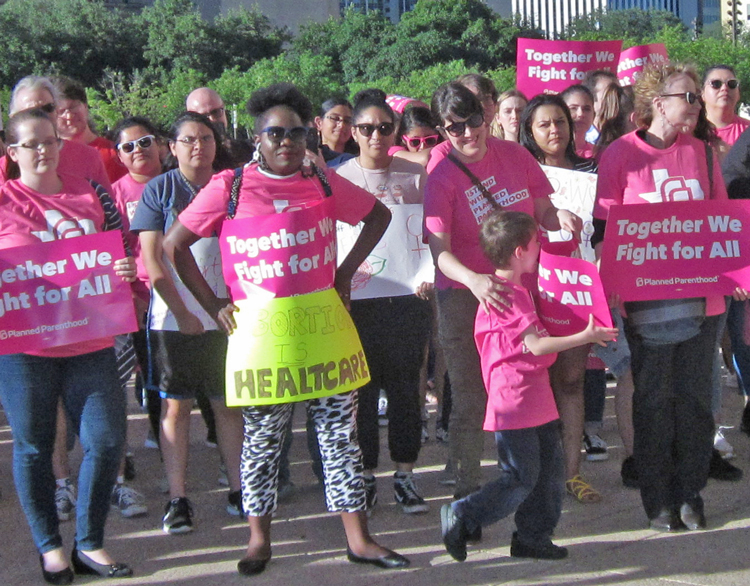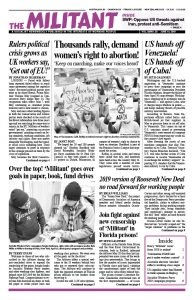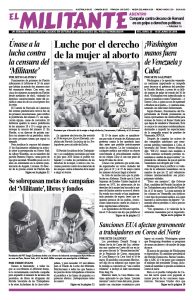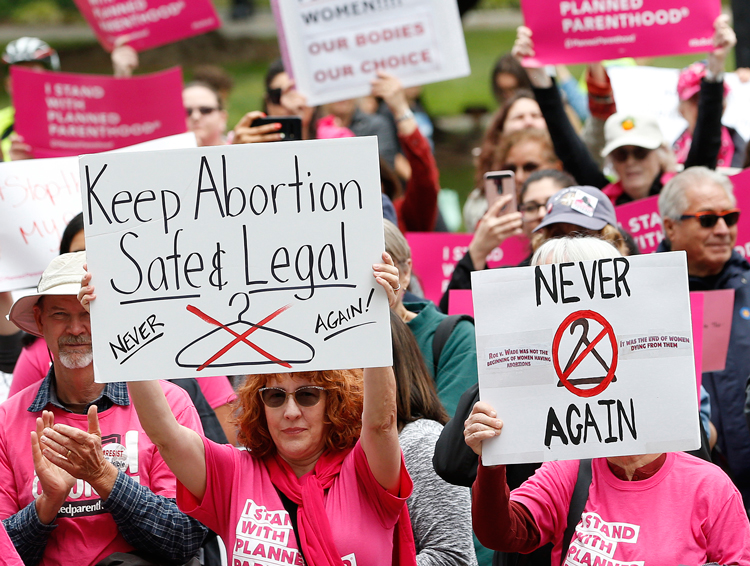“We hoped for 20 and 200 people showed up,” Heather Bradford told David Rosenfeld, Socialist Workers Party candidate for St. Paul City Council, as they both joined a May 25 protest in Duluth, Minnesota, in support of women’s right to choose to have an abortion. Bradford is part of the Feminist Justice League that organized the action.
Rallies in several cities and towns were called that day, and hundreds were held across the country May 21. They came after a number of state legislatures passed severe restrictions on abortion. Nationwide, tens of thousands of working people and youth took to the streets in the largest turnout in defense of abortion rights in more than a decade.
The gravity of the attack on women’s access to safe and secure family planning, including abortion, was driven home May 28. Planned Parenthood reported the last clinic in Missouri that provides abortion was told by state regulators they were “refusing to renew” its license and would have to close May 31.
Over 3,500 supporters of women’s right to choose demonstrated at the state Capitol in Atlanta May 25, chanting “My body, my choice.” Earlier this month the governor of Georgia signed a “heartbeat bill” into law that would ban abortion after a cardiac electrical signal is detected, typically at six weeks, before a woman often realizes she is pregnant.

A May 25 protest in Montgomery, Alabama, was put together by high school students. “We were angry about passage of the new anti-abortion law for Alabama and decided we had to make our voices heard,” Kate Nelson, a student at Auburn High School, told the Militant. A new Alabama law criminalizes nearly all abortions.
“Some of us here today don’t agree with abortion for themselves, but we all agree it has to be the woman’s right to decide,” Nelson told SWP member Susan LaMont. “It’s not the government’s right to tell us what to do with our bodies.”
Some 200 protested in San Diego, chanting “They say ‘no choice.’ We say ‘pro choice’” and “Women’s rights are human rights.” Nineteen-year-old Natalina Blake, who organized the rally, told the Militant, “I expected 50 people,” but 200 came. “I think there will be a need for another event.”
“We want to show we have a voice even though we’re younger,” said high school student Maddy Moran. “So we can have the same rights to be treated the same under the law and in our personal lives.”
In Dallas 100 people marched to City Hall in a “March for Our Rights,” which included representatives from family planning clinics and women’s shelter volunteers.
Sustained protests are needed
All of these protests are significant — they reflect the growing support for women’s right to choose and the desire of a new generation to fight to defend it. The actions create political space where a real discussion on the best course forward to defend and extend abortion rights is needed and can take place.
Today there is not a single medical facility providing abortions in 90 percent of U.S. counties and in a third of all U.S. cities — even though the latest Pew poll shows that 58% of men and women favor a woman’s right to choose abortion.
For decades opponents of women’s rights have relentlessly moved to chip away at this right, which is at the heart of women’s equality. These attacks were made easier by the fact that the 1973 U.S. Supreme Court decision legalizing abortion was based on medical criteria and decisions by doctors, rather than guaranteeing women “equal protection of the law,” as put forth by the 14th Amendment to the U.S. Constitution.
The debate over a woman’s right to control her own body, and for equal protection under the law, needs to be fought out and won through political and public debate and independent mobilizations that push back against attacks on women’s right to decide whether to have an abortion.
Defending this right “is fundamental to a woman’s control of her own life and to winning full social, economic and political equality,” Alyson Kennedy, SWP candidate for mayor of Dallas, said in a campaign statement released May 20. “This is essential to strengthening the unity of the working class to fight against the unrelenting assaults of the employers and their government.”
Alyson Kennedy from Dallas, Sam Manuel from Atlanta and Deborah Liatos from Los Angeles contributed to this article.


